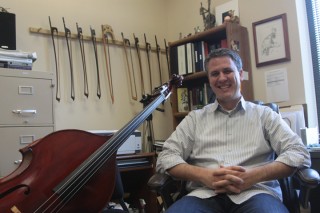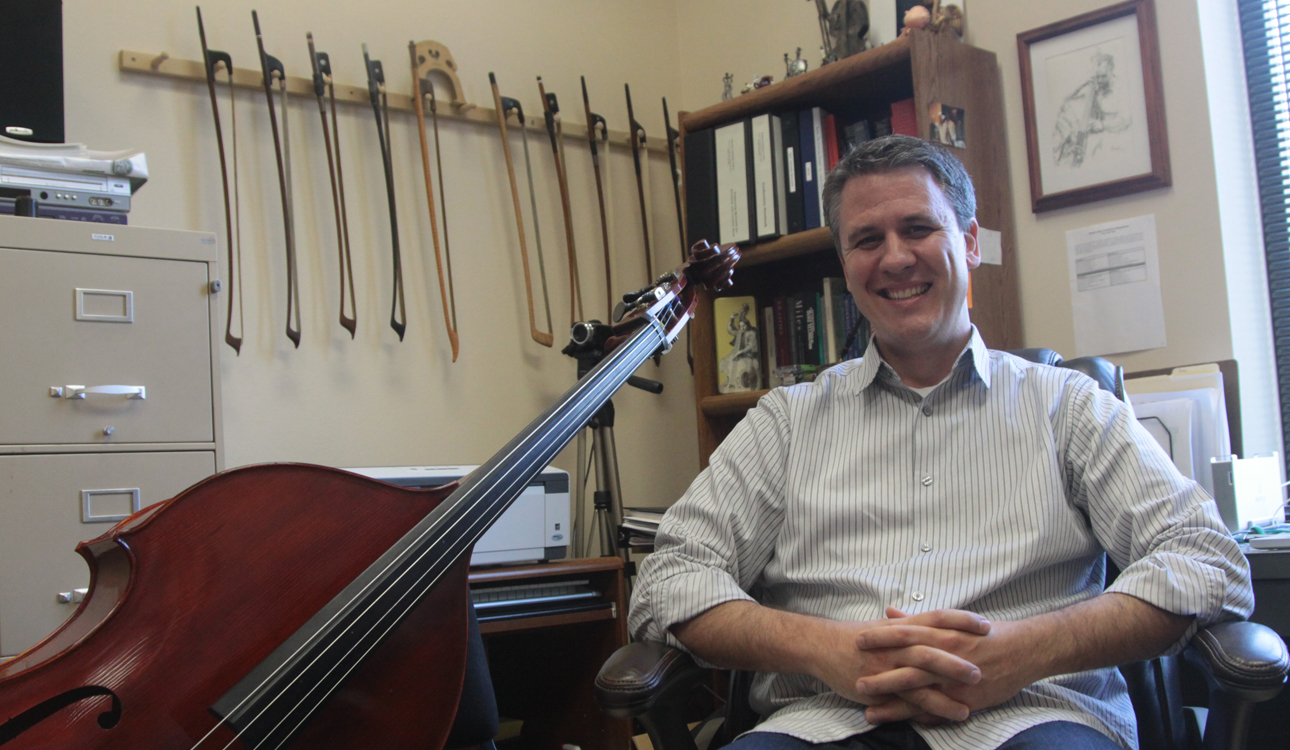
Ambika Singh | Lariat Photographer
By Ashley Yeaman
Reporter
The double bass will take center stage this evening at 7:30 p.m. in Glennis McCrary Music Building’s Meadows Recital Hall.
Dr. Sandor Ostlund, associate professor of double bass, will perform a concert featuring three unique pieces all including the double bass and created by Baylor composers.
The double bass is the largest and lowest-pitched bow string instrument, traditionally a part of the modern orchestra.
Houston junior Matthew Kline, composition major and the composer of the opening piece “Leap of Faith,” said he and Ostlund, his mentor on double bass, wanted to find a unique platform for the instrument.
“We were really frustrated with most concertos written for bass,” Kline said. “We wanted something better [that would] really let the instrument shine. This concert is presenting the bass in a radically new way. Any kind of preconceptions you have of the instrument — this concert [will put] it in a much different light.”
Kline said the creative process behind his piece involved breaking these preconceptions of the instrument.
“I was very passionate about exploring what the instrument can do,” Kline said. “I like to explore new timbres, sound and just possibilities about the way the bass can be expressed. I’m using a bass drum mallet, [incorporating] this technique where you have to use two hands and hit the [double] bass in a very unusual way.”
Ostlund said Kline’s composition technique is inventive.
“He’s really this kind of alchemist,” Ostlund said. “He’s up there trying to make gold.”
Along with his individual approach to composing, Kline said inspiration for this and every piece he writes comes from individuals who, like him, perform the music they compose.
Kline had the opportunity to study last fall with Francois Rabbath, a world-renowned double bassist, soloist and composer, and Ostlund’s former teacher.
Kline will travel to Paris, France, again this spring to study under him.
Italian double bassist Stefano Sciascia is also an inspiration for Kline. Kline said “Leap of Faith” hints at Sciascia’s work.
The inspiration for the title, “Leap of Faith,” came from a discussion with Kline’s brother, a theology major, on philosopher and theologian Soren Kierkegaard’s notion of the leap of faith.
“The whole act of faith and having a belief in God requires — it demands — that there is some doubt, that you believe in something despite the fact that it is almost unreasonable and does not make sense,” Kline said. “The leap of faith is the gift that God gives you, and that’s where [the title] comes from.”
Kline said having his piece featured is a great opportunity.
“It’s a really big honor for me to be on a program with three of my professors,” Kline said. “My [double] bass professor is performing my work, and then my piece is sitting right next to my composition professor and my theory and orchestration teacher. These are my big influences and mentors.”
Along with Kline’s “Leap of Faith”, Ostlund will perform pieces by Dr. Edward J.F. Taylor, lecturer in music theory, and Dr. Scott McAllister, associate professor of composition.
Taylor’s piece, “Ascension,” was the first piece he had written for the double bass as a feature instrument.
The piece was composed for the senior recital of Ryan Baird, who graduated in May 2011. Ostlund was also interested in performing the piece.
Taylor said as he was composing the piece, he focused on compositional structure.
“I’m very interested in formal design,” Taylor said. “So I spent a lot of time dealing with structure and working out the details of that long before I even begin to think about themes or harmonies. It’s really central to the way I work. I don’t try to tell a story as other composers sometimes do. My ideas are driven by the musical content.”
The piece was titled “Ascension” early on in its creation, initially signifying the rise of the double bass as a feature instrument, Taylor said.
“When you think of the [double] bass, you think of this instrument that’s in the back of the orchestra, off to the side, but here, the bass is really in the front and center position on the stage,” Taylor said. “The piece was also inspired by one of Taylor’s favorite authors, Dietrich Bonhoeffer.”
The final piece to be performed at the concert is “Concerto for Double Bass,” composed by McAllister.
The piece was originally composed for Ostlund and the River Oaks Chamber Orchestra, Ostlund said, but has been reduced to a solo piece with piano accompaniment.
“I approached him and asked if he would consider writing me a concerto piece, and he said yes,” Ostlund said. “He got a grant through Baylor to write this piece, and a year ago I premiered it. It was a great experience.”
The pieces may all be written by Baylor composers, but Kline said that they all offer originality.
“All of these pieces are radically different,” Kline said. “They’re not trying to be one another. They stand on their own. It’s really cool how they have their own personality. To me, not one of them pales against the other.”
Ostlund said the three pieces also provide unique challenges.
“It’s three separate worlds, and they’re all very hard — extremely difficult,” Ostlund said. “In Matt’s piece, [“Leap of Faith”] literally my fingers were bleeding. You have to hit all the stuff, and I’m practicing, and I’m starting to feel pain, and I look down and have this blood flowing down my fingers. They’re all incredibly challenging in different ways, and the music is going to be very different.”
Ostlund said the concert will illustrate the breadth of work coming from the Baylor School of Music and the innovations of the double bass within the world of music.
“It’s sort of the golden age for the double bass,” Ostlund said. “The [double] bass is coming into light today. Composers like the ones for this concert are doing stuff that wasn’t possible on the instrument. People couldn’t play then like they do today. It’s a really exciting time to be a [double] bassist and have the opportunity to work with these composers.”
The concert is free and open to the public.





